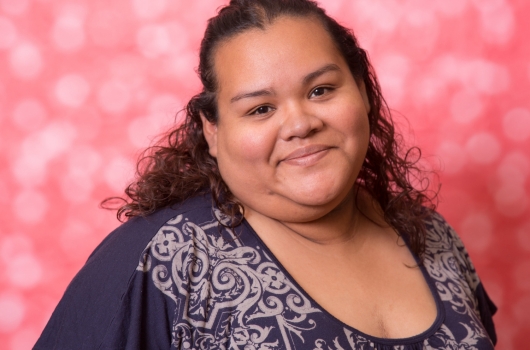Fighting for Social Justice
 2017-18 NBA XPLOR Resident Melissa Peralez
2017-18 NBA XPLOR Resident Melissa Peralez
In NBA’s strategic planning for 2018-2021, we have named Advocacy and Activism as a strategic priority, as we work to transform the root causes of social injustice. Efforts include equipping and training partners to address the critical social justice issues most relevant to their work. From April 20 to 23, NBA XPLOR Residents from Tucson-Marana and Hiram-Mantua traveled to Washington, D.C. for Ecumenical Advocacy Days (EAD), an event that aims to strengthen the voice of the ecumenical Christian community and to mobilize for advocacy through worship, theological reflection, and opportunities for witness. In this reflection, Melissa shares what it was like to learn how migration and displacement not only affects her life back home, but at her host-site too.
The experience of Ecumenical Advocacy Days was overwhelming, but informative. I was told things I was aware of and things I wasn’t.
The workshop that I enjoyed the most was the one about the Fair Food Program. It is a program that allows farmworkers to report sexual harassment, without losing their jobs in the fields or getting in trouble. One of the things I learned was about a restaurant that I recently started going to since I have been in Ohio. They had received their tomatoes from Florida for years, and two years after Florida became part of the Fair Food Program, the fast food place switched to receiving their tomatoes from Mexico, where sexual assault, sexual harassment, and other things that the Fair Food Program protect workers from, happen more. When I asked why it allows those things to happen, their answer was that the farmers are not their employees, so whatever happens to them is out of their hands. When I heard that, I was outraged. I understand that they don’t directly work for them, but why leave a partnership that kept their worker safe, for one that abuses them? We learned of a meeting that is happening in Ohio that will allow us to let this company know that we are against their choices and will allow us to peacefully protest outside the building.
I was a bit confused when the discussion of the wall or fence along the border being built came up, because as a resident of South Texas, we have had a fence around our border since 2006, and I never knew other states hadn’t experienced what we have been going through for the past ten years. I shared with a group of people that the fence has affected many in my area, people whose houses and business have been placed behind the fence on what the government considers the “Mexico side”. I also shared how people were given codes to the gate to be able to get back and forth to the United States. Also, how a business owner being a US citizen feels unsafe in his establishment because if something happens on the other side of the fence that causes a threat, he is left without protection. Also, how the government has the code to each access of the gate and can give it to whoever they please. It’s sad that Texans have been threatened with fines and being arrested if they refuse to allow the government to build the fence on their land. Farm land is separated from houses and houses are separated from Texas all because of a fence that was meant for safety and to prevent access to the US. But if a person in danger really needs a way out, a fence isn’t going to stop them. I told the group that people either climb the fence or dig under it. Unfortunately, it isn’t safe in Mexico. Since these people aren’t given permission to legally enter this country, a lot of them sacrifice their lives crossing many miles of desert in the hot sun with no food or water. Sadly, many die in the process just to find safety.
Many also send their children alone across the Rio Grande River in hopes of a better life. It’s sad to think that the DACA recipients live in fear of being sent back to a place that they don’t know, to a place whose language they do not know, all because the government feels that they are causing trouble or that the US is overcrowded. Whatever the reason, it’s not right. It’s also inhumane how I.C.E is separating families all because they see these people as a danger. I expressed my anger to the group on how these people are the ones who are doing jobs that most Americans wouldn’t even dream of doing, yet the government is kicking them out. Whether they aren’t aware of the consequences or they simply don’t care, is beyond my comprehension.
All in all, I loved my experience at EAD and hope I have another chance to unite with people of all faith to fight for social justice.
Melissa is a 2017-18 NBA XPLOR Resident. She serves at Mantua Center Christian Church and Little Village Early Learning Center.
Printer-friendly version here! >>
NBA XPLOR is a 10-month service residency opportunity for young adults ages 21-30, with the purpose of empowering young adults to discern and develop a “heart for care” as they live together in simple community, engage in direct service and justice work, engage in leadership development, and discern their vocational calls to honor the various communities they are called to serve. Learn more and apply at nbacares.org/xplor.